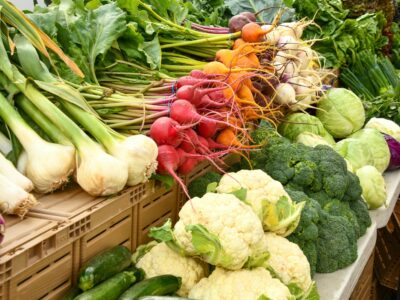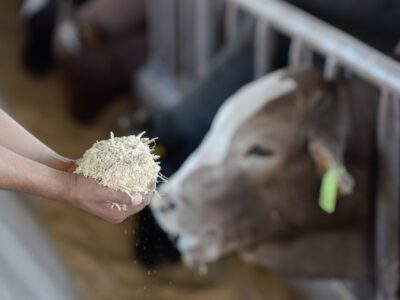One of the many charms of a farmers market is that you can shop in a relaxed, open-air environment without suffering through the cramped aisles and packed checkout lines at indoor grocery stores. In years past, that experience alone might have been enough to send you to a farmers market. But in the era of COVID-19, the fresh air and open spaces have taken on even more importance.
It’s harder to catch coronavirus when you’re outside as opposed to inside – which is one reason consumers who previously avoided farmers markets are now regular customers. Not only can customers avoid large indoor crowds, but many also find items at farmers markets that have already flown off the shelves at supermarkets.
That’s not to say it’s business as usual, however. As the industry prepares for National Farmers Market Week beginning Aug. 2, many farmers markets look much different than they did only a few months ago. Most have had to reconfigure their layouts, scale back operations, change their sales models, put systems in place to ensure social distancing, and require workers and customers to wear face masks and other protective gear.
Innovation and creativity have helped many farmers markets navigate the pandemic with minimal loss of business. For example, the Worthington Farmers Market in suburban Columbus, Ohio, only closed for a single weekend in March before reopening with a drive-thru model that lets customers buy their local produce without getting out of their cars. This necessitated a move from a mall parking lot to Worthington’s community center.
Under the new system, Worthington vendors are spaced farther apart and no money is exchanged. All orders are made online through the individual farmers’ and vendors’ websites. Customers are instructed to hang signs in their car windows that list the vendors they need, along with any other pertinent information. Volunteers direct traffic and work to ensure that cars don’t back up on nearby streets. There’s an emphasis on speed and efficiency to ensure the process is smooth.
The transition to an online, pickup-only model forced some vendors and farmers to install new online ordering systems. But by all accounts, the market has done pretty well over the past few months and allowed area farmers to maintain a key source of income.
Farmers markets in Missouri have adopted similar methods to adapt to the coronavirus, using more online platforms for orders and offering drive-through shopping options. “Even though food businesses are considered ‘essential,’ we were hearing that many farmer’s markets were not planning to open at all this year. However, there were some successful models already being explored at year-round farmer’s markets across Missouri,” said Maria Rodriguez, county engagement specialist for the University of Missouri Extension.
The Capital City Farmers Market at Loockerman Way Plaza in downtown Dover, Del., has had to scale back to four vendors this summer from 10 last year amid COVID-related government restrictions. The market also has done away with kids’ games, craft activities, food truck vendors and musicians. Now it’s just vendors selling local produce and meat.
One thing that most farmers markets haven’t had to worry about is being forced into a lockdown. Because food is an essential product, businesses that produce, distribute and sell it are considered essential, with the notable exception of restaurants. In California, Gov. Gavin Newsom named farmers markets essential businesses on the recommendation of the state’s Department of Food and Agriculture (CDFA) as well as county health officials. At least a dozen states have formally declared farmer’s markets essential businesses, while others let markets operate without formal declarations.
It’s still been a pretty tough slog for much of the industry over the last few months, however. An economic impact assessment compiled in March for the National Sustainable Agriculture Coalition predicted that key local and regional markets – including farmers markets, farm-to-school operations, and restaurants – could see a decline in sales of nearly $690 million over the following few months.
One organization that’s worked to soften the blow is the Farmers Market Coalition (FMC), a nonprofit dedicated to strengthening farmers markets across the U.S. The coalition usually spends its time promoting the industry’s healthy, organic-focused food and positive environmental impact. But lately it’s been at the forefront of efforts to help farmers weather the coronavirus through innovation, training and government help.
The FMC has lobbied to include farmers markets and related businesses in the federal stimulus relief packages. It also spearheaded efforts to increase funding for the WIC Farmers Market Nutrition Program, which provides eligible women, infants, and children with Farmers’ Market Nutrition Program (FMNP) coupons that can be used to buy food from select farmers, farmers markets and roadside stands.





